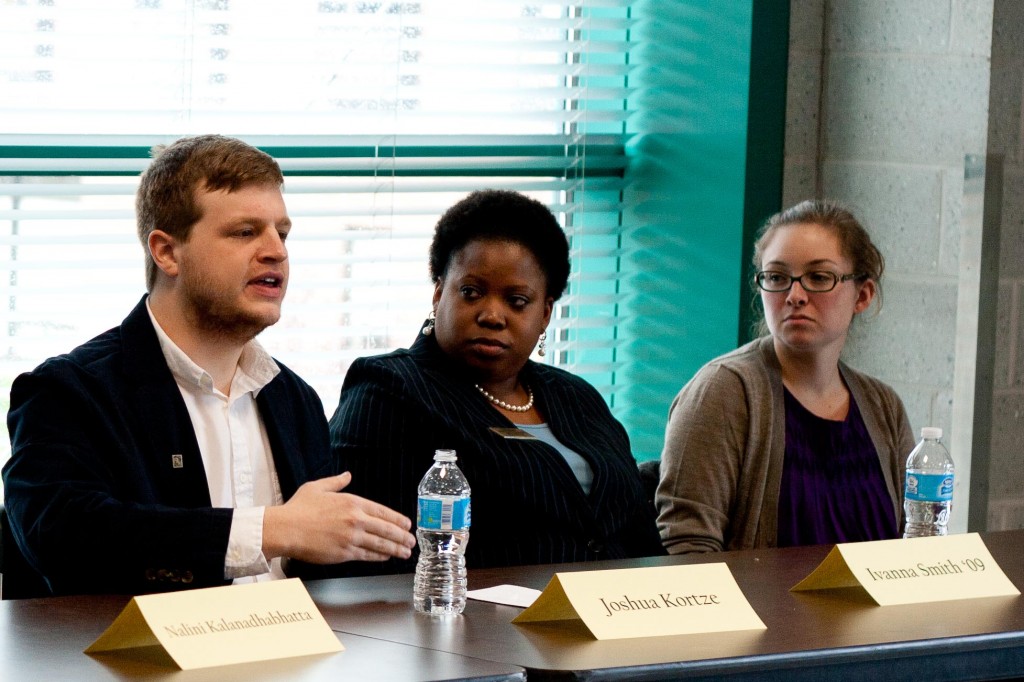
A panel of four Binghamton University graduate students and alumni talked to BU students Friday about how they can make taking a year off after graduation meaningful.
At the “Extraordinary Ways to ‘Take a Year Off’ After Graduation” event, the panelists represented various volunteer programs, including Teach For America, Peace Corps and Good Shepherd Volunteers. They shared their experiences, encouraging students to pursue new paths and goals.
Nancy Paul, director of the Career Development Center, helped organize the event with the Center for Civic Engagement. Paul considered the year after graduating from college the perfect time to do something different.
“What I like to do is provide this idea of this being able to be your window of opportunity,” Paul said. “When you are young your personal obligations might be the least amount you might ever have in your life to go have an adventure.”
Nalini Kalanadhabhatta, an AmeriCorps program assistant with Rural Health Service Corps and emergency room technician at Binghamton General Hospital, said students should volunteer for something they are interested in.
“Make the most of your experience if you can,” Kalanadhabhatta said. “Ask questions, ask for more work, ask to do different things if that is what you are interested in, because what you sign up for is not just what you sign up for.”
Julia Gallus, who served in both the Peace Corps and AmeriCorps, was president of both Habitat for Humanity and the Red Cross when she attended Binghamton University. According to Gallus, serving in the Peace Corps was a lifelong dream.
“It is one of the most valuable experiences I have ever had and probably taught me the most about who I am and where I want to be,” Gallus said.
Students asked panelists about the qualifications necessary for the volunteer programs. Ivanna Smith, a graduate student studying student affairs, said students will be matched with programs that suit them.
“Most of these programs are looking for leadership qualities,” Smith said. “They want to make sure if we put you in these positions you will be able to thrive.”
Smith also said that students should pursue their passions when looking at programs.
“You need to go back to what you love because if you are doing what you love at the end of the day it really never seems as if it is a job,” Smith said. “It just seems as if something that you love.”
Nearly 70 people attended the event designed for students looking at alternative experiences rather than attending graduate school or finding a job immediately after graduation.
Paul said the high attendance at the event indicated an interest among BU students.
“The fact that a lot of students were here I think [the event] met a need,” Paul said. “CDC wants students to know that we are here to help them explore all kinds of different options after graduation. We are not just about going into the corporate world. There is a lot of nontraditional and exciting paths after graduation.”
Christie Zwahlen, community engagement coordinator of the Center of Civic Engagement, thought the panelists’ experiences inspired the attendees.
“Hearing about everyone’s story got everyone energized. It gave people a real range of opportunities,” Zwahlen said. “We hope that the students saw that there are great benefits to the programs and there are so many opportunities with these taking a year of experience.”
Amanda King, a senior majoring in sociology, said the event motivated her to look into post-graduation alternatives.
“It made me realize that I should do some more research into the programs,” King said. “Listening to this makes Peace Corps sound a lot more appealing than I originally thought.”


